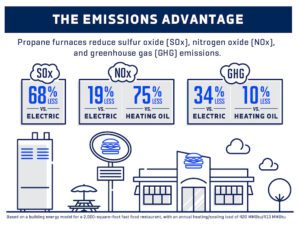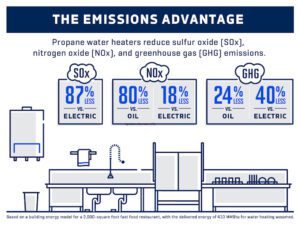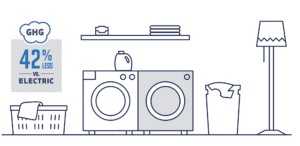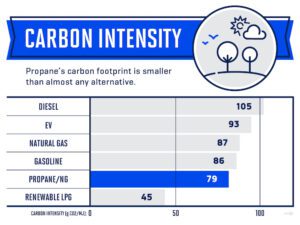Propane: Cleaner. Renewable. Affordable.
Propane is cleaner, renewable and affordable. It's a key player in creating a sustainable future that benefits everyone.
With its lower greenhouse gas emissions and cost-effectiveness, propane offers a valuable alternative to electricity.
What's often missed in environmental talks is the availability of renewable propane, providing a sustainable choice.
The videos and graphs on this page show how embracing cleaner, renewable energy sources like propane can accelerate decarbonization efforts and promote fairness in achieving zero emissions.
Propane paves the way today for a greener tomorrow.
Propane Home Appliances are Cleaner and Less Expensive
Propane home appliances are cleaner and less expensive. Let's break down why choosing propane over electricity can be a win-win for both the environment and your wallet.
Propane vs. Electricity: A Comparison
A comparison of propane v. electricity for common home uses shows why it's a smart choice compared to electricity:
Space Heating: Propane emits fewer harmful gases like nitrogen oxides, sulfur oxides, and greenhouse gases compared to electricity. Plus, it's more cost-effective thanks to better energy efficiency and lower costs per 100,000 BTUs.
Water Heating: Propane produces fewer nitrogen oxides, sulfur oxides, and greenhouse gases than electricity. With its superior energy efficiency, opting for propane can lead to noticeable savings on your energy bills.
Clothes Drying: Propane outshines electricity by emitting 42% fewer greenhouse gases, making it a greener choice for drying your clothes.
Cooking: Propane stands out by emitting 83% less sulfur oxide than electricity. Plus, it offers a superior cooking experience compared to electric stoves.
Why it's important to reduce sulfur oxides, greenhouse gases and nitrogen oxide:
It's important to reduce sulfur oxides, greenhouse gases and nitrogen oxide for a lot of reasons:
Sulfur Oxide: Also known as "SOx," sulfur oxides can worsen respiratory conditions, affect heart and lung health, and contribute to smog formation and acid rain, harming plant life and water ecosystems.
Greenhouse Gases: These gases play a crucial role in regulating the Earth's temperature, making it essential to maintain a balance to avoid extreme climate conditions.
Nitrogen Oxide: Referred to as "NOx," nitrogen oxides can worsen respiratory issues, trigger asthma and allergies, and contribute to the formation of other air pollutants.
The bottom line: Choosing propane over electricity not only benefits your household but also contributes to a healthier environment for everyone.






